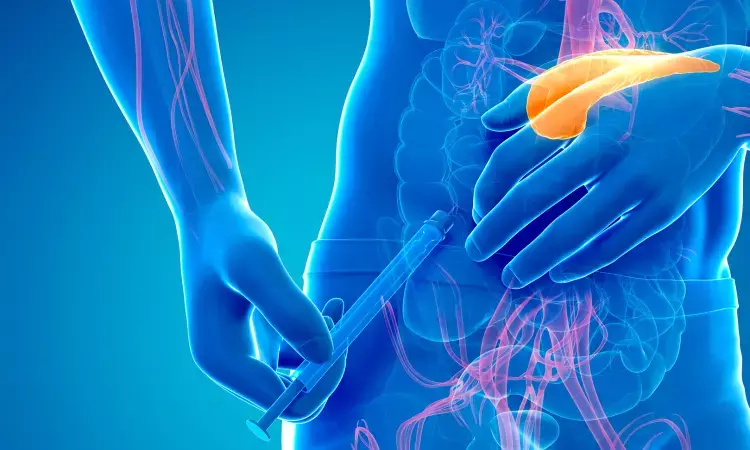- Home
- Medical news & Guidelines
- Anesthesiology
- Cardiology and CTVS
- Critical Care
- Dentistry
- Dermatology
- Diabetes and Endocrinology
- ENT
- Gastroenterology
- Medicine
- Nephrology
- Neurology
- Obstretics-Gynaecology
- Oncology
- Ophthalmology
- Orthopaedics
- Pediatrics-Neonatology
- Psychiatry
- Pulmonology
- Radiology
- Surgery
- Urology
- Laboratory Medicine
- Diet
- Nursing
- Paramedical
- Physiotherapy
- Health news
- Fact Check
- Bone Health Fact Check
- Brain Health Fact Check
- Cancer Related Fact Check
- Child Care Fact Check
- Dental and oral health fact check
- Diabetes and metabolic health fact check
- Diet and Nutrition Fact Check
- Eye and ENT Care Fact Check
- Fitness fact check
- Gut health fact check
- Heart health fact check
- Kidney health fact check
- Medical education fact check
- Men's health fact check
- Respiratory fact check
- Skin and hair care fact check
- Vaccine and Immunization fact check
- Women's health fact check
- AYUSH
- State News
- Andaman and Nicobar Islands
- Andhra Pradesh
- Arunachal Pradesh
- Assam
- Bihar
- Chandigarh
- Chattisgarh
- Dadra and Nagar Haveli
- Daman and Diu
- Delhi
- Goa
- Gujarat
- Haryana
- Himachal Pradesh
- Jammu & Kashmir
- Jharkhand
- Karnataka
- Kerala
- Ladakh
- Lakshadweep
- Madhya Pradesh
- Maharashtra
- Manipur
- Meghalaya
- Mizoram
- Nagaland
- Odisha
- Puducherry
- Punjab
- Rajasthan
- Sikkim
- Tamil Nadu
- Telangana
- Tripura
- Uttar Pradesh
- Uttrakhand
- West Bengal
- Medical Education
- Industry
GLP 1 receptor agonist superior in lowering glucose in diabetes patients treated with insulin

Taiwan: According to a study published in the Pharmaceuticals, Glucagon-like peptide 1 receptor agonists (GLP-1 RA) have superiority in lowering glucose in patients treated with insulin compared to non-insulin treated in type 2 diabetes (T2D).
It is already known that GLP-1 RA is an antidiabetic agent. This potent agent benefits T2D patients with cardiorenal and weight-losing benefits. In an attempt to intensify insulin therapy in T2D patients, GLP-1 RA and basal insulin combination have been suggested in several clinical studies.
There is a lack of evidence (real world) comparing glycemic effects of GLP-1 RAs add-on to treatment (background) with and without insulin.
To investigate the background mentioned above, Hsuan-Wen Chou, with a team of researchers, did a retrospective study.
The study points are:
- Three hundred fifty-eight patients with a history of T2D started liraglutide or dulaglutide.
- A total of 147 patients were prior and concurrent users of insulin.
- There were 211 non-insulin users.
- Hemoglobin A1c (HbA1C) and body weight changes were evaluated after 12 months of treatment.
- There was greater effectiveness of GLP-1 RAs on HbA1C reduction in insulin users.
- Between insulin and non-insulin users, there was no difference in body weight significantly at 12 months (−1.42 kg vs −1.87 kg).
- The proportion of responders or decrease of HbA1C > 1% was much higher in insulin users than non-insulin users, 48% vs 37 %.
- Insulin users who had increased insulin dosage had significantly less HbA1C reduction compared to non-increased patients −0.62% vs −1.57%.
To conclude, GLP-1RAs have superior glucose-lowering effects in patients treated with insulin compared to non-insulin-treated patients with T2D. No significant differences in body weight decrease was recorded.
Further reading:
Chou, H.-W.; Cheng,K.-P.; Lin, A.-C.; Hung, H.-C.; Lin, C.-H.; Wang, C.-C.; Wu, H.-T.; Ou, H.-Y.Real-World Comparative Evaluation of Add-On Glucagon-like Peptide 1 ReceptorAgonist in Type 2 Diabetes Treated with or without Insulin. Pharmaceuticals 2022, 15, 1569. https://doi.org/10.3390/ph15121569
BDS, MDS in Periodontics and Implantology
Dr. Aditi Yadav is a BDS, MDS in Periodontics and Implantology. She has a clinical experience of 5 years as a laser dental surgeon. She also has a Diploma in clinical research and pharmacovigilance and is a Certified data scientist. She is currently working as a content developer in e-health services. Dr. Yadav has a keen interest in Medical Journalism and is actively involved in Medical Research writing.
Dr Kamal Kant Kohli-MBBS, DTCD- a chest specialist with more than 30 years of practice and a flair for writing clinical articles, Dr Kamal Kant Kohli joined Medical Dialogues as a Chief Editor of Medical News. Besides writing articles, as an editor, he proofreads and verifies all the medical content published on Medical Dialogues including those coming from journals, studies,medical conferences,guidelines etc. Email: drkohli@medicaldialogues.in. Contact no. 011-43720751


